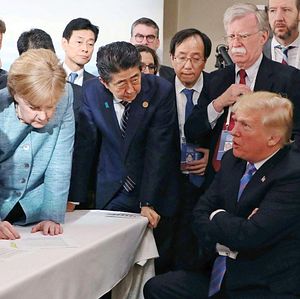After the 2016 U.S. presidential elections, leaders around the world held their breath in anticipation of cataclysmic change. In a few short months, the reins of American power would be transferred from the cerebral, liberal Barack Obama to the brash, illiberal Donald Trump. Only time would tell what form this shift would take, and how large it would be.
At this year’s Group of Seven (G7) Summit, Japanese Prime Minister Shinzo Abe got a front row seat to the change.
As the junior partner in an unequal security relationship, Japan’s dependence on the United States is not materially a new fact. What is materially new is that the United States is no longer the leader of the liberal world order that had succored the rise of defeated states like Japan.
Before heading to Quebec, Canada, for the G7, Abe stopped by Washington for a bilateral meeting with Trump. As Tobias Harris noted, Abe’s silence on economic issues is a symptom of underlying problems in the relationship. For domestic political reasons, Abe cannot complain too loudly about the United States’ poor treatment of its long-standing ally, but to have aluminum and steel tariffs imposed on it on national security grounds must be galling for Japan.
In a multilateral setting, Abe was apparently more comfortable voicing his concerns with Trump’s turn towards protectionism. At the G7 summit, he said, “[…] we must not turn back the clock. For the G7 to have exchanges of measures that restrict trade will not be in the interests of any country.” A trade war would not benefit any country, in other words; the ills of globalization lie with faulty domestic policies that do not redistribute the benefits of free trade, not with free trade itself.
Predictably, though, Japan broke with the rest of the non-U.S. G7 countries in response to Trump’s suggestion that Russia be invited back to the echelons of international society. Abe said, “It is necessary to seek Russia’s constructive role” in resolving international problems. Russia was kicked out of the exclusive club in March 2014, following the annexation of Crimea. Because Japan wants to maintain good relations with Russia in order to negotiate a peace treaty formally ending World War II and a final settlement over the Kuril Islands, Japan has never been completely on the same page as other G7 countries regarding Crimea-related sanctions on Russia. Though Abe’s recent trip to Russia disappointed Japanese hopes and expectations, Abe still wants a “win” in Japan-Russia relations.
Unlike trade issues, where Japan is aligned with other non-U.S. G7 countries against the U.S., on Russia, it is more in line with Japan’s self-interest to side with Trump. It is ironic that, in the past, Japan had to sacrifice its interest in good relations with Russia in order to appease its patron, but in the present, Japan can pursue good relations with Russia under the cover of Trump’s blessing. But if Abe had a choice between a U.S. president liberal-minded on trade matters versus a U.S. president open-minded to cooperation with Russia, Abe would likely wish for simpler times.
Japan’s foreign policy playbook has prioritized two goals: maintaining the strength of the U.S.-Japan alliance, and upholding the liberal international order. Upholding the liberal international order tangibly also means maintaining the international order’s requisite institutions, including the World Trade Organization (WTO), which Trump also attacked. Abe faces the unenviable challenge of navigating these two goals when they are in greater tension than they have been at any time in recent history.
In recent years, the G7 meetings have been derided as mere “window dressing” to international politics. Yet, it may be true that you only miss something once it’s gone. At least the G7 used to be a predictable opportunity to reaffirm shared values. With even the window dressing torn to shreds now, both predictability and shared values are out. The world is again holding its breath to see what the erratic U.S. president will do next to dismantle the order the United States had spent decades investing in.

































